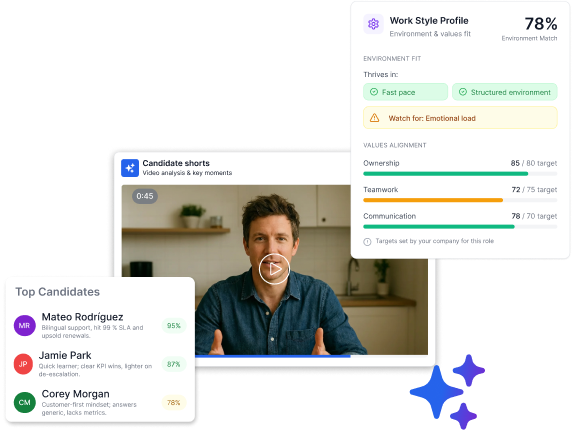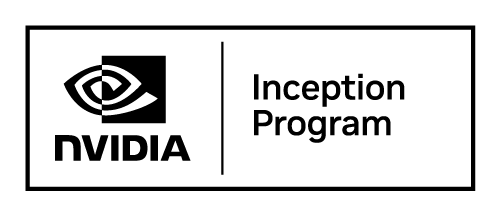Hiring has transformed dramatically for small businesses in recent years. Many companies are using AI video interview software not just to post jobs or collect applications, but to actually screen candidates efficiently. This shift is reshaping how small HR teams and founders evaluate applicants without additional recruiting staff.
One of the biggest changes is the rise of AI-powered screening in the interview process. These platforms don't replace human judgment entirely, but they help small teams quickly build ranked shortlists from high-volume Easy Apply applications. For many resource-constrained businesses, this technology offers the first viable alternative to hours of manual résumé review.
This article explains what the AI interview process is, how it helps small teams, and why more lean businesses are adopting these solutions at affordable monthly pricing.
What are AI interviews and why they matter for small teams
AI interviews use artificial intelligence to help small HR teams and founders quickly build ranked shortlists without coordinating phone screens. Instead of scheduling live calls, candidates record responses to preset questions on any device, and AI candidate summaries help evaluate their answers efficiently.
The AI interview process includes video recordings that platforms like Truffle analyze using structured evaluation criteria. Small businesses adopt this technology to manage high application volumes without hiring additional recruiting staff.
Organizations choose AI interview software for three main reasons:
- Time efficiency: Help small teams quickly build ranked shortlists from hundreds of applications in minutes instead of days
- Consistent evaluation: Every candidate answers identical questions with structured scoring criteria
- Cost-effective scaling: At $99-289/month, dramatically more affordable than enterprise solutions or additional hiring staff
While traditional interviews require extensive coordination between busy founders and candidates, one-way video interview platforms eliminate scheduling chaos while providing deeper insights than résumé screening alone.
How AI interview platforms work for small businesses
When candidates participate in AI interviews, they interact with platforms designed for simplicity and high completion rates. The process typically starts when they receive a secure link to complete their screening at their convenience.
Most AI interviews follow a streamlined structure: the platform presents questions, candidates respond via video or audio, and algorithms help you quickly build ranked shortlists. Behind the scenes, AI candidate summaries process factors like communication skills, cultural fit, and role alignment.
Machine learning models and candidate evaluation
The core technology behind AI interviews is machine learning; algorithms trained to help small teams quickly build ranked shortlists by recognizing patterns that indicate job success. These models process candidate responses to identify qualities relevant to specific roles.
For customer service positions, AI interview systems might evaluate communication clarity and problem-solving approaches. The AI examines:
- How candidates explain their experience
- Their approach to workplace challenges
- The structure and professionalism of their responses
Most platforms don't just record what candidates say but analyze how they communicate—helping small teams identify candidates likely to succeed in customer-facing or team-based roles.
Natural language processing and communication assessment
AI interviews rely heavily on natural language processing (NLP) technology that helps platforms understand human communication patterns. This allows systems to help you quickly build ranked shortlists based on more than just keywords.
NLP tools analyze:
- Relevant experience and skills mentioned
- Communication clarity and professionalism
- Enthusiasm and cultural fit indicators
For example, when candidates describe past achievements, the AI might detect confidence and specific accomplishments, scoring these as favorable traits for leadership or customer service roles.
Benefits and limitations of AI interview software for small teams
AI interviewing tools offer significant advantages for resource-constrained businesses, but they also come with important limitations. Understanding these helps small teams set realistic expectations about the process.
Efficiency and scalability for lean businesses
For small businesses receiving dozens or hundreds of applications, AI interview software helps manage volume without expanding recruiting teams. The technology works 24/7, allowing candidates to complete assessments whenever convenient—perfect for busy founders managing multiple responsibilities.
AI interview platforms can handle multiple applicants simultaneously, eliminating scheduling bottlenecks. This is especially valuable for:
- Seasonal hiring surges at retail or hospitality businesses
- High-turnover positions with constant application flow
- Small teams managing multiple open positions across locations
For candidates, this often means faster feedback and shorter hiring timelines. Most AI interview processes provide results within days rather than weeks, helping small businesses compete with larger employers for top talent.
Potential bias and ethical considerations
While AI aims to provide consistent evaluation, these systems require careful implementation to ensure fairness. AI interview tools learn from training data—if not properly designed, algorithms might inadvertently favor certain communication styles or backgrounds.
Key considerations include:
- Training data diversity: Ensuring AI learns from diverse, successful employee examples rather than narrow historical patterns
- Technical accessibility: Candidates without reliable internet or updated devices may face disadvantages
- Transparency: Most platforms now provide clear explanations of evaluation criteria and decision factors
Responsible AI interview platforms like Truffle include human oversight and regular bias audits to address these challenges. The technology continues improving, with better fairness and transparency features.
Data privacy and security for small businesses
AI interviews collect candidate data, raising important privacy considerations for small businesses. When implementing these systems, companies must understand what information is collected and how it's protected.
Before AI interviews, candidates typically receive information about:
- What data is collected during screening
- How long information is stored
- Who has access to their responses and evaluations
Many jurisdictions now regulate AI interview data usage. Small businesses benefit from platforms that handle compliance automatically rather than requiring legal expertise to navigate these requirements.
Types of AI-driven interview formats
AI interview tools come in several formats, each designed for different small business hiring needs. Understanding these variations helps teams choose the right approach.
Asynchronous video interviews
The most common AI interview format involves candidates recording video responses to preset questions. There's no live interviewer—just candidates, their device cameras, and structured question sequences.
These asynchronous interviews typically provide brief preparation time before recording begins. Candidates usually complete all questions in one session, though some platforms allow re-recording for better responses.
The benefits for small teams include:
- Complete flexibility in candidate scheduling
- Consistent evaluation criteria for all applicants
- No travel or coordination requirements for initial screening
Small businesses across retail, healthcare, and professional services use these systems to efficiently screen large candidate pools before involving busy founders or managers in final interviews.
Skills-based assessments
For technical or specialized roles, AI often evaluates job-specific abilities through practical exercises. These assessments present relevant challenges while monitoring candidate problem-solving approaches.
AI systems might evaluate:
- Technical knowledge demonstration
- Problem-solving methodology and creativity
- Communication of complex concepts
These assessments focus on demonstrable skills rather than just personality fit. Small businesses benefit from standardized technical evaluations without requiring specialized interviewer expertise.
Text-based screening
Some AI interview platforms use written responses rather than video. These text-based assessments evaluate written communication skills and job knowledge through structured questions.
Text-based interviews offer several advantages for small teams:
- Reduced appearance bias in evaluation
- Lower stress for some candidates
- Focus on content quality and relevant experience
This format works well for roles requiring strong written communication or when video technology creates barriers for candidate participation.
Tips for succeeding in AI interview processes
Candidates can optimize their AI interview performance by understanding how these systems evaluate responses. These strategies help navigate algorithmic assessment effectively.
1. Test technology requirements first
Before starting AI interviews, verify that your device, internet connection, and browser work properly with the platform. Technical problems can disrupt assessments and affect evaluation results.
Essential preparation steps:
- Complete the platform's compatibility check
- Test microphone and camera functionality
- Close unnecessary applications that might impact performance
If technical issues occur during interviews, most platforms provide support contacts. Don't hesitate to seek help if problems arise.
2. Use clear, structured communication
AI systems analyze communication patterns, so clarity helps ensure accurate assessment. When answering questions, organize thoughts logically and speak at a moderate, professional pace.
Effective communication strategies include:
- Starting responses with main points
- Supporting claims with specific, relevant examples
- Concluding with brief summaries when appropriate
Using structured response methods like STAR (Situation, Task, Action, Result) helps create answers that AI can analyze effectively, especially for behavioral questions.
3. Practice with available resources
Many AI interview platforms offer practice versions or sample questions. Using these helps candidates become comfortable with the format before actual assessments.
Helpful practice resources include:
- Platform-specific practice sessions
- General interview preparation tools
- Communication skills assessment apps
These tools provide feedback on factors like speaking pace, clarity, and answer structure—all elements that AI systems typically evaluate.
4. Emphasize job-relevant experience
AI interview systems match responses against specific job requirements. Review job descriptions carefully and highlight skills and experiences that directly relate to posted requirements.
When discussing background, emphasize:
- Specific achievements relevant to the target role
- Skills and competencies mentioned in job postings
- Experiences demonstrating required capabilities
This alignment helps AI systems recognize qualifications and match candidates to appropriate opportunities.
Looking ahead: Evolving trends in AI hiring for small businesses
The AI interview process continues developing rapidly, with new innovations making advanced hiring technology more accessible to small teams.
Recent developments include:
- Enhanced communication analysis that better evaluates soft skills
- Mobile-optimized platforms improving candidate completion rates
- Integration capabilities connecting AI interviews with existing small business tools
These technologies aim to create more engaging, accurate assessments while remaining affordable for resource-constrained businesses. While traditional interviews won't disappear, AI-driven screening will likely become standard for initial candidate evaluation, especially for small teams managing high application volumes.
As these tools evolve, success comes from demonstrating authentic skills and experiences clearly. The technology may advance, but the fundamental goal remains connecting qualified candidates with suitable small business opportunities.
Empower your small business hiring with AI interview technology
Understanding AI interview processes helps small business owners and hiring managers approach these tools with confidence. While the technology may seem complex, remember that the fundamental goal remains unchanged: efficiently connecting qualified candidates with appropriate positions.
Modern AI interview platforms like Truffle are designed specifically for small teams who need to quickly build ranked shortlists without enterprise complexity or additional recruiting staff. At $99-289/month, these solutions provide sophisticated screening capabilities previously available only to large corporations.
Whether you're a candidate preparing for AI assessments or a small business owner considering these tools, the technology continues reshaping hiring—making the process more efficient while maintaining the human judgment that drives workplace success.
FAQs about AI interview software for small businesses
Here are some of the most common questions about AI interview software.
Can AI interviews accurately evaluate soft skills like teamwork and cultural fit?
AI interview platforms can assess communication skills and cultural alignment through structured questions and response analysis, but most small businesses use them for initial screening while relying on human judgment for final cultural fit decisions.
How do small businesses implement AI interview technology with limited budgets?
Small businesses can access AI interview platforms through affordable monthly subscriptions starting at $99-289/month, making advanced screening technology accessible without enterprise-level investments or lengthy implementation processes.
Are AI interviews accessible for candidates with different technical capabilities?
Most modern AI interview platforms work on standard devices and browsers, with mobile-friendly options ensuring broad accessibility. Platforms typically provide technical support and compatibility testing to minimize barriers.



